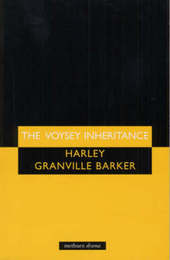
|
The Voysey Inheritance
Paperback / softback
Main Details
| Title |
The Voysey Inheritance
|
| Authors and Contributors |
By (author) Harley Granville Barker
|
| Series | Modern Plays |
|---|
| Physical Properties |
| Format:Paperback / softback | | Pages:128 | | Dimensions(mm): Height 198,Width 129 |
|
| Category/Genre | Plays, playscripts |
|---|
| ISBN/Barcode |
9780413776099
|
| Classifications | Dewey:822.912 |
|---|
| Audience | |
|---|
| Edition |
New Edition - New ed
|
|
Publishing Details |
| Publisher |
Bloomsbury Publishing PLC
|
| Imprint |
Methuen Drama
|
| Publication Date |
20 April 2006 |
| Publication Country |
United Kingdom
|
Description
Financial chicanery and ethical conflict in early twentieth-century classic being revived at the National Theatre Edward's highly principled world is turned upside down when his father reveals that he has been illegally speculating with clients' money. To make matters worse, he soon discovers his large, scandal-fearing family would perpetuate the crime rather than risk public dishonour. 'Of course it's pleasant and comfortable to keep within the law . . . then the law will look after you. Otherwise you have to look pretty sharp after yourself. You have to cultivate your own sense of right and wrong . . . deal with your own justice. But that makes a bigger man of you, let me tell you.' This magnificently observed, hugely enjoyable portrait of an upper-middle-class family was written by the father of 20th-century British theatre, Harley Granville Barker, ten years before the First World War finally sent old values flying. The play was first staged at the Court Theatre, London, in 1904. It opens at the Royal National Theatre on 18 April 2006.
Author Biography
Harvey Granville Barker (1877-1946) started his career in the theatre by working for his mother sing ing and performing in platform and drawing room recitations. Once he was established, he did more th an anyone else to change the theatre of his day. In 1899 he joined the committee to campaign for a N ational Theatre and directed plays including Galsworthy's Strife and translated Arthur Schnitzler's Anatol. He visited Stanislavsky's theatre in Moscow and brought his ideas back to England, revolutio nising English theatrical development. He set up the Court theatre (1904-1907), was a champion of th e work of Bernard Shaw and wrote the ground breaking work Prefaces to Shakespeare.
|